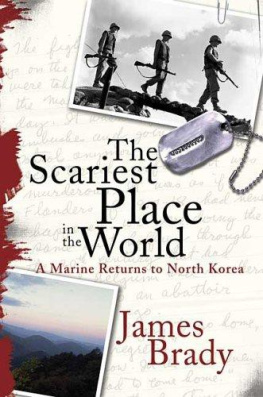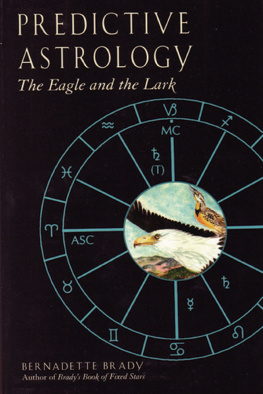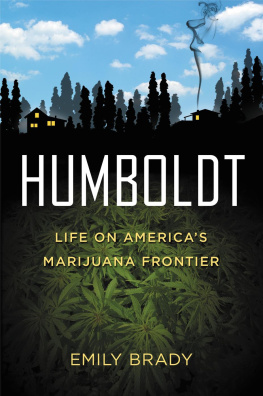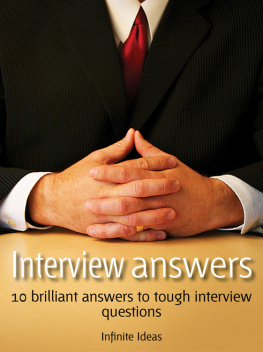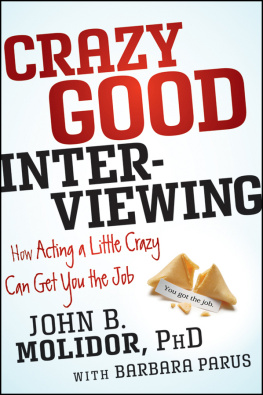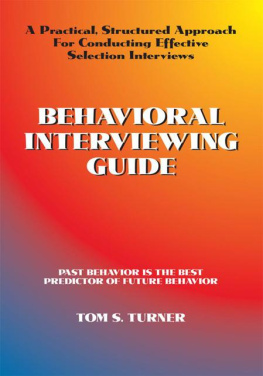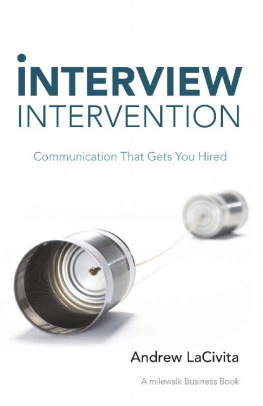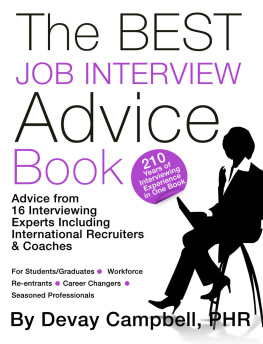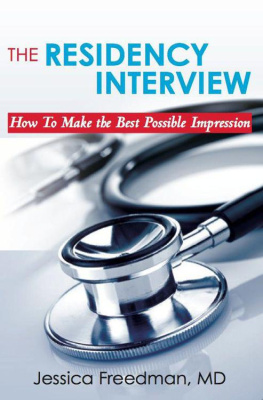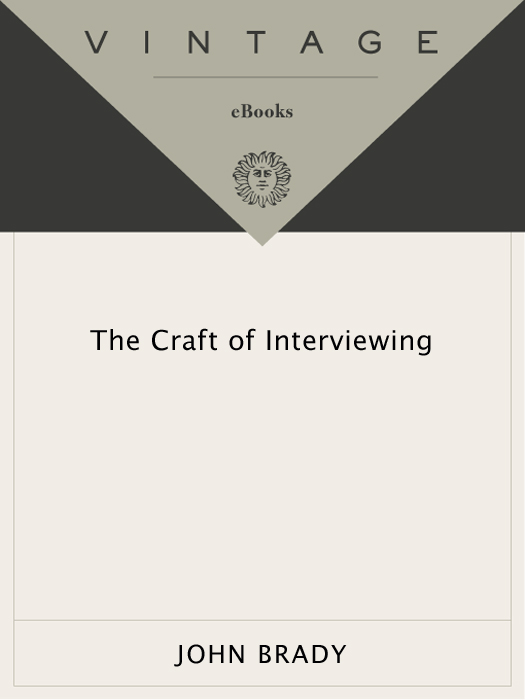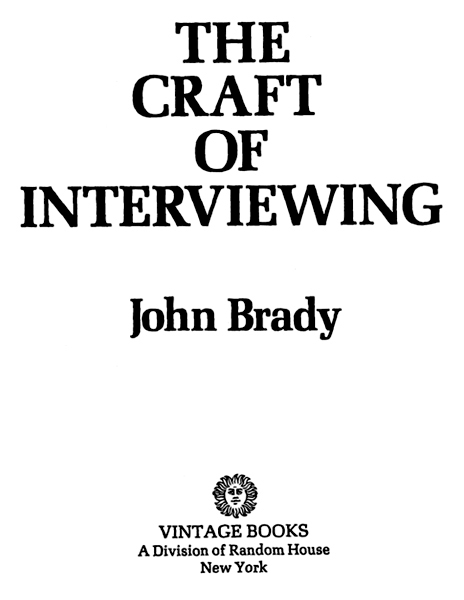Copyright 1976 by John Brady
All rights reserved under International and Pan-American Copyright Conventions. Published in the United States by Random House, Inc., New York, and simultaneously in Canada by Random House of Canada Limited, Toronto. Originally published by Writers Digest in 1976.
Library of Congress Cataloging in Publication Data
Brady, John Joseph, 1942
The craft of interviewing.
1. Interviewing (Journalism) I. Title.
PN4784.I6B67 1977 070.43 77-76543
eISBN: 978-0-307-77828-4
v3.1
Speech is the index of the mind.
Seneca
Out of thine own mouth will I judge thee.
Luke 19:22
You can tell your paper, the great man said,
I refused an interview.
I have nothing to say on the question, sir;
Nothing to say to you.
And then he talked till the sun went down
And the chickens went to roost.
O. Henry
Acknowledgments
I never use the word very. Its always superfluous. Except now. These people are special. Very. My warmest thanks and gratitude to them for being themselves and for being there along the way.
Rose Adkins
Sister Alice Regina, O.P.
James Ballowe
Mary Barrett
Jeanne Brooks
Christopher Buckley
Rie Calabrese
Al Candia
John Christie
Mae Dick
Eugenie Beck Dowling
Lynne Ellinwood
Murray Fisher
Barker D. Herr
Robert Holibaugh
Pete Johnson
Richard Loomis
Charles Matusik
Susan May
Reya Maxymuk
Phil Moffitt
Kirk Polking
Bob & Manya Prahl
Rex Reed
Dick & Lois Rosenthal
Allan Scott
Art Spikol
Philip Spitzer
Gay Talese
Leon Taylor
Bob Thomas
Bill Truskoloski
Joe Wambaugh
Skip Weiner
for
Lilia & Leona
the women in my life
Contents
Getting an interview with someone is like asking your good-looking cousin to go out with a friend of a friend on a blind date: you must approach the subject Just So. Fortunately, there are so many ways of approaching him. You can phone him, write him, telegram him, stalk him, badger him (even if hes a Sonny Liston), plead with him, pay him, or woo his secretary. And you neednt be a celebrity to interview a celebrity no more than you need be a cab driver to interview a cab driver. What you do need for celebrity or cabbie (a fetching introduction, an interview appointment), and what you should brace for (ground rules, cash requests) are laid out in this chapter Among plenty else.
You can tell when some writers are about to embark on research. Their eyes freeze over, like a winter windshield. They look stooped and fatigued. They become, in short, martyrs, and its not necessary, because research can be fun: gold-digging in almanacs, wooing the librarian, getting the goods on your interviewee from his old schoolteachers. The thrill of discovery, and the feeling of being truly prepared for an interview is exhilarating. Anyway, it sure beats asking Vivien Leigh what part she played in Gone With the Wind, and watching her turn Scarlett.
At last, the long moment of truth: meeting the interviewee head-on. Now is the time to hone your horns, paw the ground, and mark off your turf, no? No. Now is the time for rapport. For friendly even if pointed conversation. Role-playing helps. So does sensible dress. Gabbing, however, is risky. The observation may be elementary, but it is important, says John Hohenberg. No talking reporter ever held a decent interview.
Many writers seem to have studied interviewing at medical school. But but how do you feel Mr. Beethoven? About being a genius and all. How do you really feel! Reprieve, please. Lead us not into dull interrogations. Provoke your interviewee with open-ended questions of issue and controversy; then provide the reader with color by egging your subject into anecdotes. Plan your questions a little. And make that opener a winner. Hal Higdon once started an interview with, Why dont you tell me a little bit about what youve done? If you dont know, retorted the subject what are you doing here?
OK, fella. No more glib answers, or Im going to rinse out your bridgework. Now just how do I get tough in an interview? With glurg moderation. Getting tough does not mean getting mean. It means persisting politely, even gently, if the interviewee is inexperienced. Blame someone else for the question. Start it off with some praise. Study Barbara Walters. Above all, be a professional about it, and I dont mean a bleg professional wrestler!
Vexation is a cop who provides a bevy of anecdotes about sex on the waterfront, then leans back and says, Uh, thats off the record, of course. You should throttle him. But you can also outfox him by confirming the stories elsewhere; by bargaining with him for a veiled attribution; or by damning his torpedo eyes, and running the stories with full speed and attribution. Tis a case of conscience. Let your reader and this chapter be your guide.
An interviewer without notes is like a comedian without writers: naked and defenseless. Yet poor notes cuneiform style can backfire; and excessive notetaking can pry loose the writers grasp on the essential points. Herewith are tips for those interviewers with palsied script, mortal memory, and the best of intentions: on reaching casually for the notebook; on shorthand and instant editing; on capturing color; on doing a Capote, with coaching from a certain Truman.
The recorder can be the interviewers dearest friend when its working. You can never be sure, though, so you glance at it furtively every few minutes, and your interviewee sees you, and he glances at it and starts worrying if the words of gold hes serving up are being preserved for posterity, and there goes your interview. Relax. Its probably working. Ignore it. Concentrate on your subject. Take backup notes. Act natural, and just be sure you read this chapter before pressing Play on that blasted machine.
Along the interviewing trail lie many a mudhole and maddening subject. Consider: Marilyn Monroe, the chronic late-comer; Hugh Hefner, holding forth at four in the a.m.; Federico Fellini, with a mouthful of french fries; Hubert Humphrey in a roller coaster; Lenny Bruce in the bathroom; and Barbara Harris in a snit. And there is more, gentle reader, too awful to describe with hints for surviving the tardy, the tired, the busy, the bored. And you think you got problems?
Neither method is as wide or as deep as a face-to-face interview, but either will often do admirably. The mailbox, for example, is a dandy way to interview 100 subjects at once without holding a conference in Atlantic City. And the telephone is handy when your interviewee is in the City of Angels and youre in Brooklyn and in trouble with your editor because the profile was due yesterday. But the secret of written and phone interviews is this: they are strongest when yoked together. Read all about it.
Bringing the interview to an artful close is an art in itself. You want to leave your interviewee with the impression that he is doing the closing. And even after the last good-bye, you must still verify the facts in the interview, untangle conflicting stories, get your sources approval of the transcript (if you really need it), and cultivate him with an eye toward future stories. A writers work is never done.



